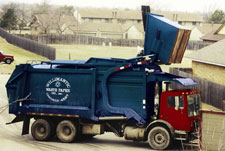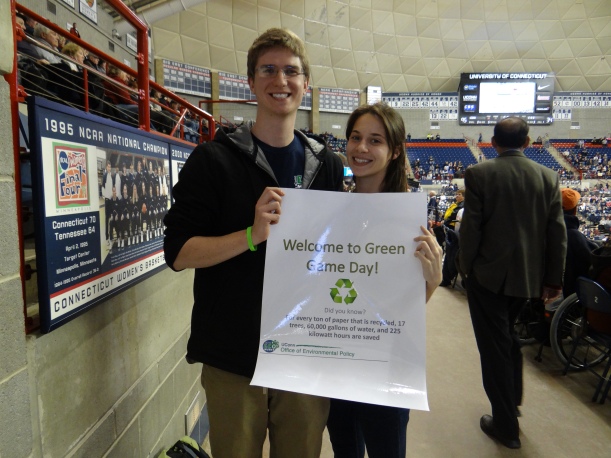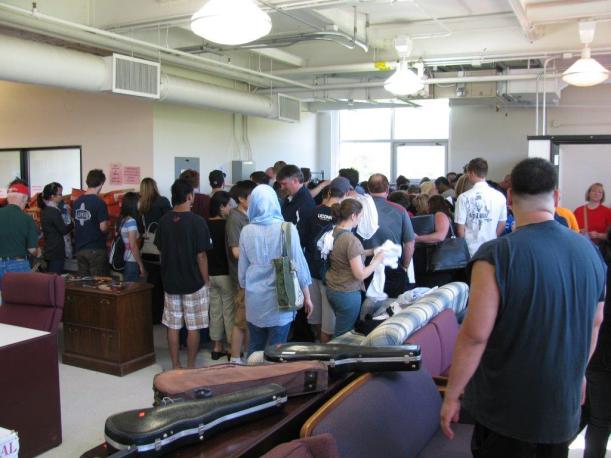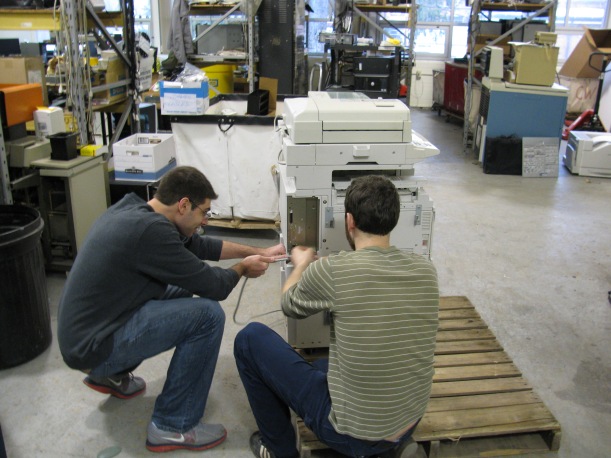By Rachael Shenyo, UConn Sustainability Coordinator
In my position as sustainability coordinator, I receive a lot of questions regarding what I would refer to as our waste reduction and management program at UConn. A program, in this sense, is anything that your University does that touches the concept of waste management and reduction, including procurement of supplies, disposal of hazardous waste, placement of recycling bins, use of composting, etc.
I recently compiled information for the 2012 Sierra Club Cool Schools survey, where I had to detail the tonnages of waste from various sources, and trace what happens to that waste. The process prompted me to write a blog series on waste management at UConn, in order to help interested personnel understand how waste management happens at the University, and what kinds of volumes we deal with (where applicable). The next section will deal with how students, staff, and faculty can navigate our various recycling channels most effectively. The third section will cover the vision for the future, and ways that you can get involved.
Sources of Waste:
The major sources of waste at UConn Storrs Campus can be divided into a
few groups for simplification:
– Dining Halls
– Residence Halls and Student Areas- Procurement and Supply
– Construction- Academic and Support Buildings
– Laboratory and Medical/ Biomedical
– Landscaping
– Agriculture
Classification of Waste:
Waste from each area should then be considered by type; resulting in classes within each area such as hazardous waste, bio-hazardous waste, organic waste, bulky waste, reusable items, recyclable waste, compostable non-organic waste, electronic waste (“e-waste”), and non-compostable inorganic waste. Even within categories, there may be more than one classification. For example, cell phone batteries are a type of e-waste that are classified as hazardous, and must be handled as such when not encased in cell phones. Some organic wastes can be composted, and some cannot be. Proper waste classification is the key to any recycling or reuse program.
Composting:
 Much of our regular waste is comprised of organic food wastes, and Dining Services has pilot programs in place that are testing trayless initiatives
Much of our regular waste is comprised of organic food wastes, and Dining Services has pilot programs in place that are testing trayless initiatives
and food composting in three of the largest dining halls. Food waste, including meat scraps, is collected and composted in an e-correct machine to be reused as fertilizer in these programs. http://www.dining.uconn.edu/local_routes_sustainability.html.A large composting facility on Rte. 32 was opened in 2010 to handle agricultural and landscaping waste. It currently handles 100% of organic landscaping waste (grass
clippings, tree branches, discarded plants, etc.), and a significant portion of manure waste. The 2011 amounts reported were 800 tons of manure waste composted (50% of the total generated), and 21.25 tons of landscaping waste. The 800 and so odd tons of waste not composted were used as fertilizer for the farm fields. Due to varying nitrogen levels, not all manure waste is suitable for our composting facility.
Construction Waste:

Construction and repair projects generate a lot of waste that does not get included in our regular waste stream. The work on projects is performed by independent consultants, who sub-contract for waste removal and recycling. While exact rates are unknown, a review of practices shows that contractors are recycling as much as 95% of all waste generated on any given project, due partly to regulations for LEED contracting, and partly due to high landfill costs.
Reuse and Donation Programs:
By far the University’s largest re-use program is run internally through Central Stores, which handles procurement, distribution, and collection of University-owned property. All large materials distributed to the University- furniture, computers, etc.- are returned to the Central Stores warehouse. Items that can be, are refurbished, and either reused at the University or sold through the Public Store. Only items beyond repair are discarded, and they get handled through the regular waste stream. http://www.stores.uconn.edu/surplus.html#obtain

Dining Services runs a food donation program at the end of the year, and the Office of Community Outreach coordinates a huge moving out program that collects items for donation and reuse by local charities and non-profits. Called “Give and Go,” this program collects over 12,000 lbs of items each year.
http://ecohusky.uconn.edu/recycling/giveandgo.html
The Office of Environmental Policy also collaborates with Willi-Waste and the Nike “Re-Use a Shoe Program” for its annual sneaker recycling drive, which in 2012 collected almost 4000 lbs of used sneakers for reuse and recycling.
Recycling Program:
UConn Storrs campus runs its recycling program through Willi-Waste, which recently went to Single Stream recycling. This means that all recyclable materials can be mixed together in the same receptacle, because they are later sorted mechanically and manually at the processing plant. NOTE: Single stream does not mean that garbage is mixed with recycling, simply that plastics can be mixed with glass, cardboard, and paper. Last year, we recycled 888.76 tons of material through the mainstream program.
http://www.youtube.com/watch?v=Z_H-B0jeFhE&w=420&h=315
Hazardous, Radioactive and Bio-Waste:
As a research and medical university, we produce a fair amount of items that cannot be disposed of via regular trash. By law, all hazardous and biological waste is handled through our Environmental Health and Safety (EH&S) Office, which works with areas that generate this type of waste to provide appropriate receptacles and schedule pick-up times for secure and safe handling and storage. Loose batteries of all kinds are handled by either EH&S (lithium, alkaline) or the Motor Pool (vehicle). http://www.ehs.uconn.edu/Regulated%20Waste%20Management/index.php
E-Waste:
Waste that contains electronic components, dubbed “e-waste,” is handled in 3 different ways. Our e-waste recycling program collects used cell phones, printer and toner cartridges, laptops, i-phones, mp3 players, and other small handheld devices in bins located throughout campus. These items are collected by the OEP, packaged, and donated for recycling. The money from the sale of the items is used as a donation to the Campus Sustainability Fund. Students, staff, and faculty may contribute to the e-waste program. http://www.ecohusky.uconn.edu/E-Waste.htm#RecycleWhere
Central Stores collects all larger items (computers, televisions, etc.) and recycles 100% of the ones that cannot be refurbished as part of their program, recycling over 60,000 lbs of material total some years.
Regular Waste Stream:

All items from academic and residential areas not covered by one of the above programs is handled via our regular waste stream. In 2011, the UConn campus generated 4253 tons of materials via the regular waste channels. This material is incinerated in closed systems for electricity generation, creating a byproduct of ash that must be stored in landfills. In the next two segments, I will be writing about how we are working to reduce this amount, and how you can get involved in the process.
http://williwaste.com/



























 Much of our regular waste is comprised of organic food wastes, and Dining Services has pilot programs in place that are testing trayless initiatives
Much of our regular waste is comprised of organic food wastes, and Dining Services has pilot programs in place that are testing trayless initiatives


